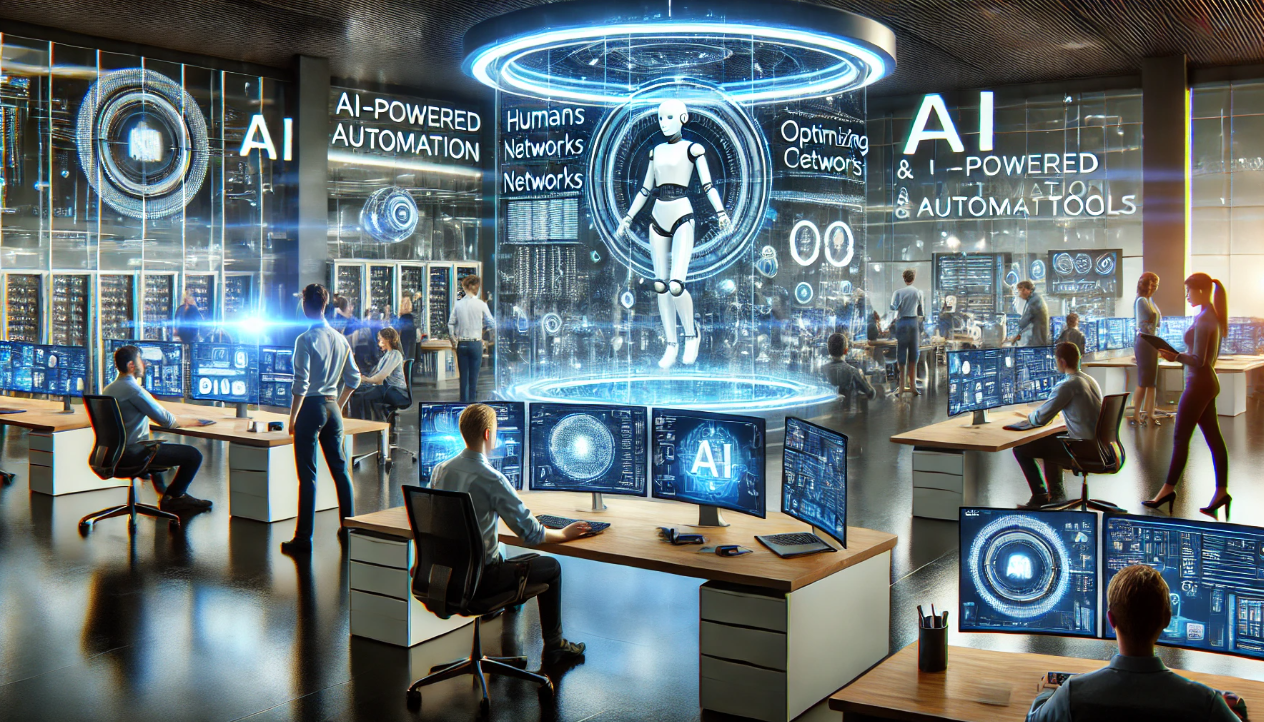The Role of AI and Automation in IT Jobs: Will You Still Have a Job in 2025?
Introduction
Artificial Intelligence (AI) and automation are transforming the IT industry at a rapid pace. Tasks once handled by humans are now being automated, leading many IT professionals to ask:
Will AI take over my job? Or will it create new opportunities?
What This Guide Covers:
✅ How AI is impacting IT jobs
✅ Jobs at risk vs. jobs in demand
✅ Essential skills to future-proof your IT career
✅ How to adapt & stay ahead of AI-driven automation
By the end, you’ll know how to navigate the future of IT and remain indispensable in 2025 and beyond.
1. How AI & Automation Are Changing IT Jobs
AI is already reshaping the IT landscape. From automated cybersecurity to AI-driven coding assistants, companies are integrating automation to reduce costs and improve efficiency.
Where AI is Making the Biggest Impact in IT
| Area | AI’s Role | Impact on Jobs |
|---|---|---|
| Software Development | AI-assisted coding (e.g., GitHub Copilot, ChatGPT) | Increases productivity but reduces demand for junior developers |
| Cybersecurity | AI-driven threat detection | More focus on AI security analysts |
| Cloud & DevOps | Automated infrastructure management (AIOps) | Shifts focus to cloud automation specialists |
| Technical Support | AI chatbots & virtual assistants | Reduces low-level support roles but increases AI oversight jobs |
| Data Science & Analytics | AI-driven insights & automation | More demand for AI-specialized data engineers |
Example: GitHub Copilot helps developers write code faster but doesn’t replace them—it enhances productivity.
✅ Result? AI isn’t eliminating IT jobs—it’s changing how they function.
⚠️ 2. IT Jobs Most at Risk Due to AI & Automation
Jobs That AI is Likely to Replace
❌ Entry-Level IT Support – AI chatbots handle basic troubleshooting.
❌ Manual QA Testers – AI automates repetitive testing.
❌ Basic System Administrators – Cloud automation replaces routine server management.
❌ Low-Level Data Entry & Reporting – AI generates reports faster than humans.
❌ Junior Developers (Some Tasks) – AI speeds up coding, reducing demand for basic programming roles.
What This Means:
AI will replace repetitive, rule-based tasks, but human oversight is still essential for complex problem-solving, creativity, and decision-making.
✅ Adapt by learning AI integration & automation tools!
3. IT Jobs That Will Be in High Demand in 2025
While some jobs are declining, many roles are emerging due to AI & automation.
High-Demand IT Jobs in 2025 & Beyond
| Job Role | Why It’s in Demand? | Required Skills |
|---|---|---|
| AI & Machine Learning Engineer | Businesses need AI solutions | Python, TensorFlow, NLP |
| Cybersecurity Analyst | AI can predict threats, but human security is still crucial | Ethical hacking, SOC, AI security |
| Cloud Engineer (AWS, Azure, GCP) | Cloud automation is booming | DevOps, Kubernetes, Terraform |
| AI-Powered DevOps Engineer (AIOps) | Companies want automated CI/CD pipelines | Jenkins, Docker, AI monitoring |
| Data Engineer & AI Specialist | AI needs clean, structured data | SQL, Python, Big Data |
| IT Automation Engineer | Companies want efficient IT workflows | Ansible, Terraform, RPA |
| AI Ethics & Compliance Officer | AI needs ethical oversight | AI policy, compliance, bias detection |
✅ Result? IT professionals who adapt to AI-driven tools will future-proof their careers.
️ 4. Skills You Need to Stay Relevant in an AI-Driven IT Industry
Top Skills for IT Professionals in 2025
✅ 1. AI & Machine Learning Basics
Learn how AI tools like TensorFlow, PyTorch, OpenAI APIs work.
Understand how AI automates IT tasks (e.g., automated testing, AI-driven monitoring).
✅ 2. Cloud & DevOps Automation
Master AWS, Azure, Google Cloud.
Learn Terraform, Kubernetes, and CI/CD pipelines for automated deployments.
✅ 3. Cybersecurity & AI Ethics
Understand how AI impacts security (e.g., AI-driven phishing, automated threat detection).
Learn Zero Trust security models and AI compliance regulations.
✅ 4. Advanced Programming & Automation
Learn Python, JavaScript, and Rust for automation.
Use Ansible, Bash scripting, PowerShell for infrastructure automation.
✅ 5. Problem-Solving & Critical Thinking
AI can’t replace human intuition, so analytical skills are critical.
Develop expertise in troubleshooting, AI bias detection, and algorithm optimization.
✅ 6. Soft Skills (Communication & Leadership)
AI tools still need human collaboration & strategy.
Learn project management, negotiation, and leadership skills.
What This Means: IT professionals who combine AI knowledge + automation + critical thinking will dominate the job market.
5. How to Adapt & Future-Proof Your IT Career
1. Learn AI & Automation Tools
✔️ Take AI/ML online courses (Coursera, Udacity, Google AI).
✔️ Experiment with AI-powered coding assistants (GitHub Copilot).
2. Get Certified in High-Demand Fields
✔️ Cloud Certifications: AWS, Google Cloud, Azure.
✔️ Cybersecurity: CEH, CISSP, AI & Security.
✔️ AI & Data Science: TensorFlow Developer, Google AI Engineer.
3. Build AI & Automation Projects
✔️ Automate a personal project using AI.
✔️ Create a self-healing cloud server using AI monitoring tools.
✔️ Build a chatbot or AI assistant using OpenAI’s API.
4. Stay Updated on Industry Trends
✔️ Follow AI and IT automation blogs, podcasts, and research papers.
✔️ Join tech communities & attend AI/IT conferences.
✅ Result? Those who embrace AI & automation will stay ahead of the job market.
Final Verdict: Will AI Take Your IT Job?
AI will NOT replace IT jobs—but it will replace IT professionals who don’t evolve.
Repetitive, rule-based jobs will be automated.
High-value, AI-enhanced IT roles will emerge.
Final Recommendation:
✅ Learn AI, automation, and cloud technologies.
✅ Upskill in cybersecurity, DevOps, and AI ethics.
✅ Focus on critical thinking, problem-solving, and leadership.
AI isn’t taking your job—it’s giving you a chance to work smarter, faster, and better!
Would you like a roadmap for transitioning into AI & automation roles? Let me know!

